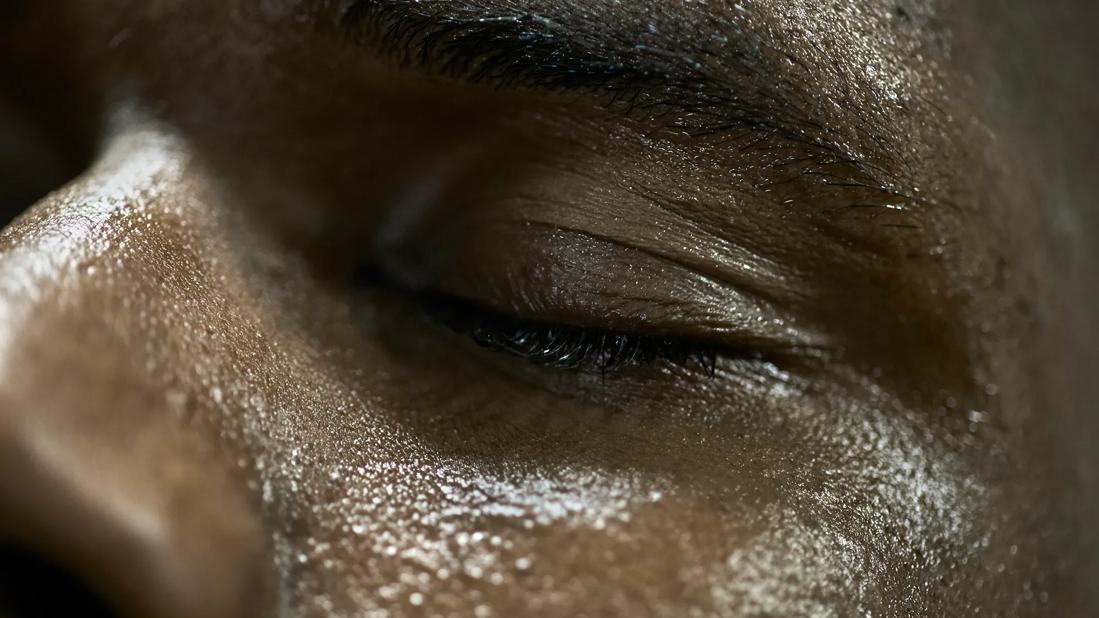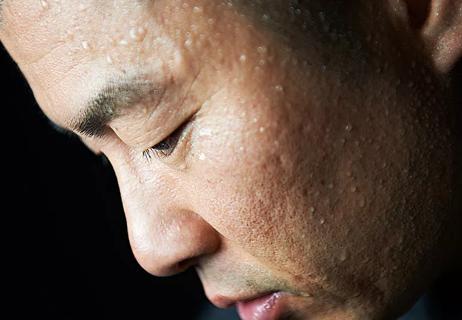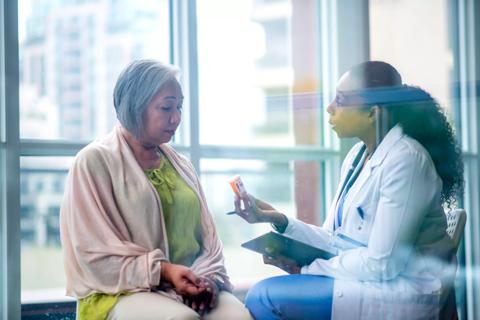It can be a warning sign of low blood sugar or something more serious like a heart attack

Sweat is your body’s natural coolant. Those little water droplets on your skin help lower your body temperature when you get too hot.
Advertisement
Cleveland Clinic is a non-profit academic medical center. Advertising on our site helps support our mission. We do not endorse non-Cleveland Clinic products or services. Policy
But what if you’re sweaty and cold at the same time? Is that a sign of something serious?
Maybe, says internal medicine specialist Andrei Brateanu, MD.
“Get immediate medical attention if you develop cold sweats,” he advises. “Cold sweats aren’t a condition. They’re a warning sign that something’s not right. You may have a medical condition that requires prompt treatment.”
Dr. Brateanu explains what you need to know about cold sweats and why you should seek help.
Cold sweats mean you’re sweating despite feeling cold. These two reactions don’t typically go together.
“Normal sweating is a response to a rise in body temperature, usually from heat exposure or physical activity,” Dr. Brateanu explains. “Sweating brings down your temperature, so you feel cooler.”
Cold sweats can occur with other symptoms like:
Several conditions can bring on cold sweats. Here’s a look at seven common causes.
An overactive thyroid gland makes too much thyroid hormone (hyperthyroidism). When you have too much thyroid hormone, your metabolism speeds up. You may feel anxious, have heart palpitations and sweat more than usual.
That’s because your metabolism helps regulate your body temperature.
Advertisement
“Unexplained sweating can occur with several conditions affecting the endocrine system,” says Dr. Brateanu.
For instance, cold sweats can be a sign of a rare adrenal gland tumor called pheochromocytoma. This noncancerous tumor causes your body to make too much of the hormone adrenaline, which leads to cold sweats.
The link between cold sweats and endocrine disorders makes sense when you understand the role the hypothalamus plays in regulating body temperature. This gland deep in your brain is the main link between your endocrine system and nervous system. Its primary job is to keep your body stable, called homeostasis.
“When hormonal changes from endocrine disorders raise your body temperature, your hypothalamus sends a message to your sweat glands,” explains Dr. Brateanu. “The glands respond by making sweat to cool you down.”
Cold sweats can be a sign of coronary artery disease. This type of heart disease occurs when plaque deposits build up inside your arteries. Plaque clogs your arteries, slowing blood flow to your heart. You’re at risk for a heart attack if the plaque completely stops blood flow.
Because cold sweats are a common heart attack symptom, Dr. Brateanu stresses the importance of calling 911 when you feel cold and sweaty.
“Even if you aren’t having classic heart attack symptoms like chest pain, seek immediate medical attention,” he says.
Some people have what’s known as silent heart attacks that cause different symptoms, like shortness of breath. Tests can determine if you’re having a heart attack, so providers can quickly begin lifesaving treatments.
Hormonal changes, especially those that occur during menopause, can cause hot flashes and other symptoms. As the name implies, you feel hot and sweaty during a hot flash. But afterward, cold sweats can start as your body returns to its normal temperature.
Viral infections like the flu and COVID-19 can raise your body temperature, bringing on a fever. As you start feeling better, your temperature drops, which can lead to cold sweats. Bacterial infections can also cause cold sweats.
“People with staph infections like sepsis often have cold sweats as their immune system works extra hard to fight the infection,” says Dr. Brateanu.
A quick drop in blood sugar can make you feel cold and clammy. People with diabetes, especially those who use insulin treatments, are more prone to low blood sugar (hypoglycemia).
“Sometimes, too much insulin or oral diabetes medications can cause blood sugar levels to drop too low, especially if you don’t eat enough after taking the medicine,” says Dr. Brateanu.
Advertisement
Some people experience a dip in blood sugar within two hours after eating. The cause of reactive hypoglycemia is a bit of a mystery, but eating too many simple carbohydrates, including sweets, may cause this reaction.
Blood sugar levels may also drop when you exercise strenuously, drink alcohol or go too long without eating.
In addition to cold sweats, low blood sugar can also cause:
You may break out in a cold sweat when you experience intense pain from an injury or a painful condition like gallstones or kidney stones.
“Cold sweats occur when pain triggers your body’s fight-or-flight mode,” says Dr. Brateanu. “Adrenaline floods your body, raising your blood pressure and making you sweat.”
Cold sweats that occur when you’re in extreme pain can also be a warning sign that you’re going into shock.
“Shock is a life-threatening emergency that indicates your organs aren’t getting enough blood,” says Dr. Brateanu. “This condition requires immediate care.”
Injuries, severe allergic reactions and insulin shock can cause you to go into shock. In addition to cold sweats, you may have:
Advertisement
Stress and anxiety also trigger the fight-or-flight response. You may have cold sweats, and your heart rate and breathing may speed up.
Cold sweats are common during panic attacks. Panic attacks cause symptoms similar to a heart attack, including sweating, nausea and chest pain.
“If you have cold sweats, get immediate medical attention to rule out a heart attack,” says Dr. Brateanu.
Cold sweats themselves aren’t dangerous, but the underlying condition that’s making you sweat could be.
“Cold sweats can be a sign of a serious health problem,” says Dr. Brateanu. “Without a proper medical examination, you can’t know for certain if the cold sweats are due to anxiety, stress or a heart attack.”
That’s why Dr. Brateanu says don’t wait to seek medical care if you have cold sweats.
“You might feel OK when the sweating stops, or you might feel silly seeking care when you think the symptom is just temporary,” he says. “But it’s safer to know what’s going on than to put your life in danger.”
Cold sweats differ from other forms of sweating in several ways. Cold sweats:
Advertisement
It depends. The first step is figuring out what’s causing them. Once you’ve ruled out something serious like a heart attack, you may be able to take certain steps to prevent them. You can:
Cold sweats don’t always mean you have a health condition. But only a healthcare provider has the expertise to figure out what’s causing them. A medical expert can also make sure you get the right treatment. Because some conditions that cause cold sweats can be life-threatening, it’s important to take them seriously.
“Ignoring this symptom could prove devastating,” says Dr. Brateanu.

Sign up for our Health Essentials emails for expert guidance on nutrition, fitness, sleep, skin care and more.
Learn more about our editorial process.
Advertisement

If you’re waking up drenched, it could be menopause, stress, medications and other causes

Exercise, weather, anxiety, hormone changes and spicy foods can cause you to perspire more than usual

Stay cool by wearing breathable clothes, eating certain foods and using an antiperspirant

One reduces the amount of sweat, while the other masks body odor

Tackle perspiration and odor by wearing breathable fabrics, showering after exercising and using an absorbent powder

The sweaty truth: why sweet smells turn foul

Keeping your skin dry, wearing the right clothes and investing in anti-chafe products can help minimize skin irritation

Heat starts in your chest and moves up to your neck and face … and then, the sweating begins

Even small moments of time outdoors can help reduce stress, boost mood and restore a sense of calm

A correct prescription helps your eyes see clearly — but as natural changes occur, you may need stronger or different eyeglasses

Both are medical emergencies, but they are very distinct events with different causes